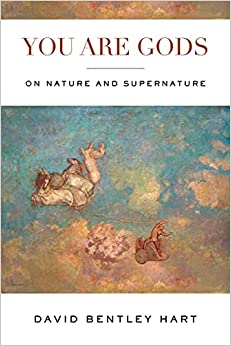Hart begins this section with the observation that both he and his foil presumably agree with the statement that grace perfects not abolishes human nature. The question, for Hart, however, is how can a rational creature be transformed beyond its every intrinsic potency and given a final end wholly extrinsic to its own nature without thereby ceasing to the creature it has hitherto been? The answer given by his foil, according to Hart, is that human nature possesses a “kind of indeterminate ontological plasticity, open to whatever is not repugnant to the creature’s nature, and yet also somehow open to actualities genuinely extrinsic to that nature.” p.10. In other words, how can human nature be given a gift wholly extrinsic to its nature, without that nature being lost, and thereby its humanity being lost in the process? Hart considers this gibberish.
In Hart’s ontology, “we can become only what we are.” p.11. The potential of theosis must always already be found within the very structure of our nature. Anything wholly extrinsic to human nature must remain forever extrinsic or else the essential nature of our humanity is somehow lost.
Hart takes up the question of whether God could create a rational human nature not called to deification. Hart answers the question with a resounding “no!” God cannot create a square circle. The very property of being rational necessarily includes the desire to have union with God who is the very source of rationality. Hart goes on to state that a spiritual creature can possess no purely natural end at all. Therefore, the need for superadded grace which is merely contingent upon divine favor is logical nonsense.
Hart’s argument is that every rational will, when unencumbered and freely moved, is always purposeful towards an end. Any act lacking purposefulness is by definition not an act of rational freedom. Further, the end to which the purposeful act is always directed is the Good. A finite object cannot be the purposeful end in and of itself, but only as a provisional end for the sake of something beyond itself. A finite object may be more compelling than another finite object, but only because the former is (rationally perceived) to be closer to the Good, otherwise the choice between finite objects cannot be rational. “What pleases us most immediately can be intentionally desired only within the context of a rational longing for the Good in its own fullness.” p.14.
Hart states that “Reason must love the Good.” p.15. An inherent property in rationality is that it desires the Good, which is what makes the nature rational. For example, Hart states, “to desire to know the truth is to desire that everything opaque to the understanding in experience . . . progressively vanish, until the mind and world together achieve perfect transparency one to the other. The mind longs for the first not only to reach, but to become that divine truth. . . . Rational spirit, teleologically specified, is God.“
Hart concludes this part with his observation that “Nothing can be ordained to an end not intrinsic to its nature . . . for there is no natural light apart from the prior illumination of the light of glory.” p.17. Rational thought and desire can only be directed towards that which it already knows and is inherent in its very being and fabric. The final cause to which it is directed is the sole explanation for its rational existence. “To recognize the shape of rational desire, then, is to acknowledge that the real indwelling within the rational spirit of a final cause that is nothing less than intrinsically divine.” Grace only can call out that which is already there.

